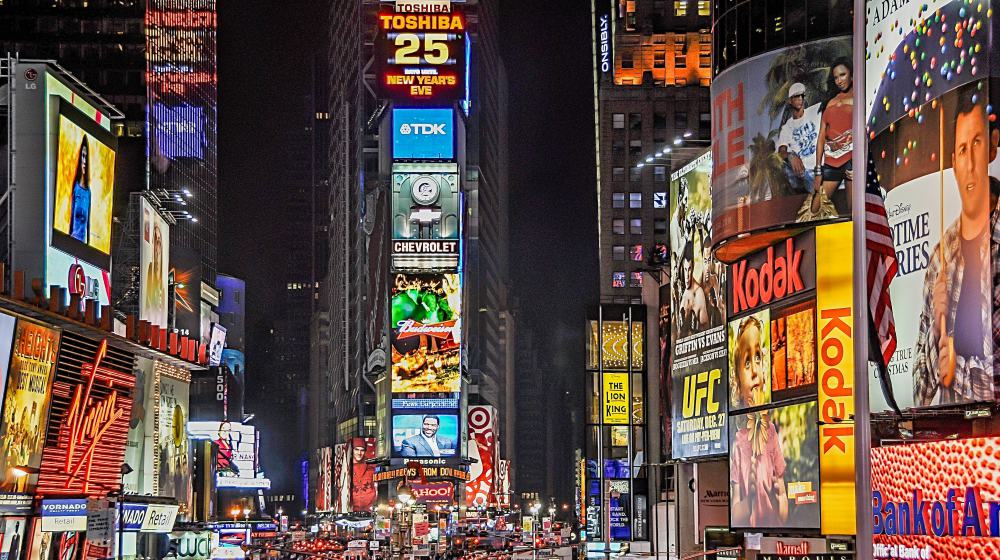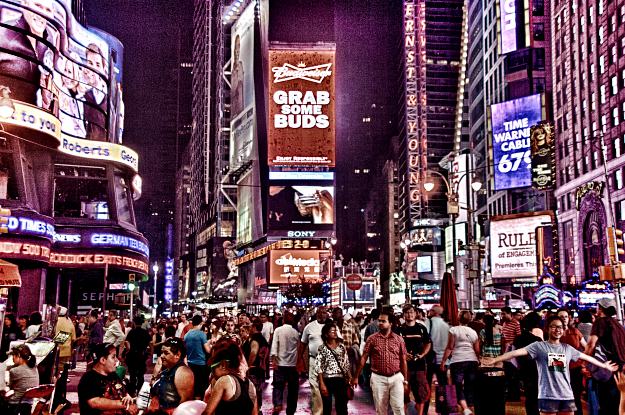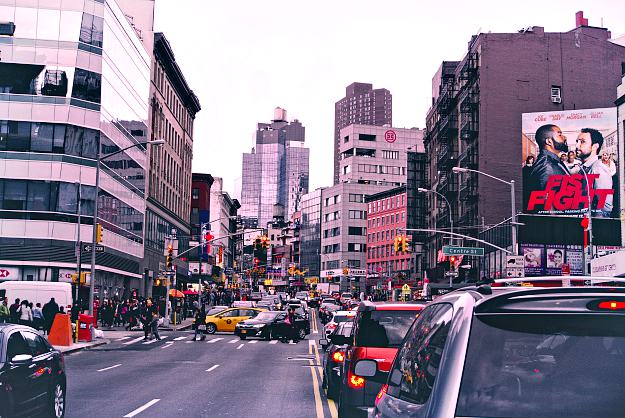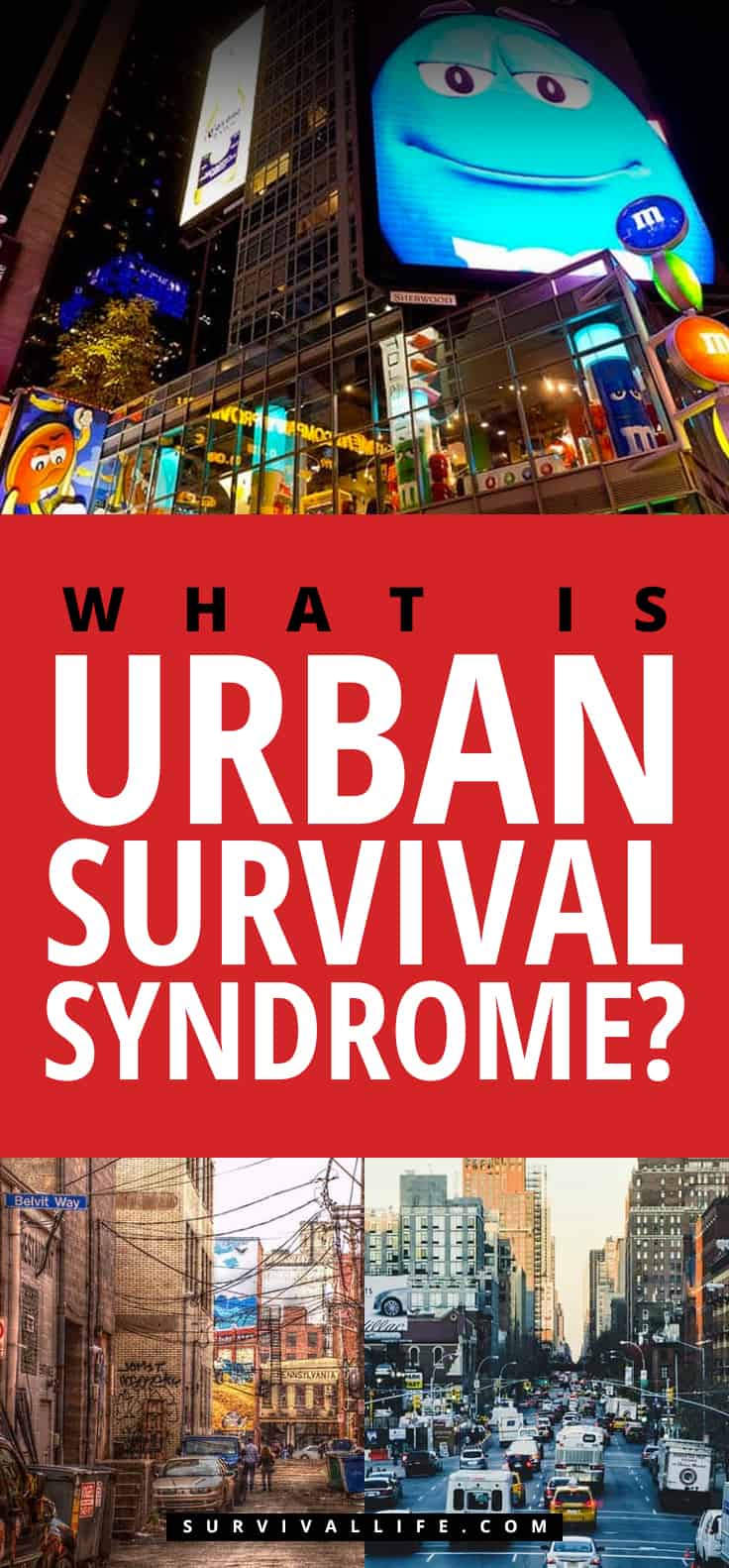opinion
What Is Urban Survival Syndrome?

Have you ever asked the question: what is urban survival syndrome? Read on to learn more about this relevant and timely issue here!
In this article:
- Big City Fears Unleashed
- A Study into Urban Survival Syndrome
- Continued Research
- Urban Survival Syndrome Meaning
- How Urban Survival Syndrome Died
- Criticisms of Urban Survival Syndrome for Defense
- Are Bad Cities Driving Us Crazy?
- What You Can Do
All About Urban Survival Syndrome
Big City Fears Unleashed

If you’ve ever lived in a rough neighborhood, then you know that feeling. That feeling you get when you leave in the morning for work, wondering how many damaged windows will there be. When you walk down the street, in your mind, don’t smile, don’t show weakness, and keep that game face on. When you lock the door behind you upon getting home. The feelings right before you sleep as you go through your mental checklist. Is the back door and front door shut? Did you lock the windows? You get the drill…
A Study into Urban Survival Syndrome
Whether we like to admit it or not, living in a dicey neighborhood can mess you up. In 2014, a study published in the Peer J journal found this out. Spending time in a crime-prone neighborhood made research volunteers more paranoid. The surprising part is how little time it took for the paranoia to set in. Less than an hour, according to researchers.
“We … bused volunteers to one or other neighborhood at random, and had them walk around for 45 minutes.” Researcher Daniel Nettle, a professor of behavioral science at Newcastle University, explained.
“We found that by the end of the walk, the volunteers in the high-crime neighborhood also said they trusted others less and felt more paranoid,” he said.
Nettle continued by pointing out that after their “short visit,” to a rough part of town, his research volunteers experienced what it was like to be in the mindset of “the residents who lived there.”
“It’s interesting because it shows not just that our environment affects our state of mind, but that it does so very rapidly,” he added.
Continued Research
Yet, this isn’t the worst part. A separate 2016 study by researchers at Duke University and King’s College London had these findings. There are different urban survival syndrome cases, such as they found children living in violent neighborhoods exhibit higher rates of psychotic symptoms.
Then there are the victims of violence themselves. They suffer PTSD at rates comparable to soldiers who experienced front-line combat. Put simply, the science shows, rough neighborhoods dramatically shape how locals and visitors alike experience the world around them. Is it time then, to revisit the long-discredited urban survival syndrome?
RELATED: Real World Urban Survival Tactics: An Interview With Richard Duarte
Urban Survival Syndrome Meaning
The notion of urban survival syndrome points to a little more than a poor excuse for unacceptable aggressive social behavior. The Urban Dictionary describes it as a “fear-thy-neighbor mentality.” It causes its victims to “feel they have no way of protecting themselves from crime or violence, except by killing anybody who threatens or harasses them.”
“Such mentality is usually the result of living in violent, crime-prone (typically inner-city) areas for long periods of time, and/or watching too much television (no joke),” the internet’s most authoritative dictionary explained.
At this point, almost everyone who lived in a rough neighborhood is probably nodding. If you haven’t felt the tug of urban survival syndrome yourself, you probably know someone who shows signs of it. Despite this, paranoid individuals with anger management issues use the supposed syndrome as a lame excuse.
How Urban Survival Syndrome Died

Its slide into cynical Internet joke started before the Internet itself really took off. Back in 1994, urban survival syndrome was used as a defense in the trial of Texan African American teenager Daimion Osby. Osby was facing two counts of first-degree murder, after gunning down two unarmed men in a parking lot. The backstory: the two men had been hounding Osby for months over the outcome of a game of street craps.
“Our guy [Osby] just didn’t show these fellows the proper respect … and they just increased the level of violence until he was fearful for his life,” defense attorney David Bays told The Washington Post at the time.
In other words, Osby’s defense was simple: he had been so terrorized that he believed it was either kill or be killed.
At the time, the case became a media sensation, as Osby’s lawyers experimented with what is now known as the urban survival syndrome defense. Used much like the classic temporary insanity defense, the idea looked like it could catch on. The original trial ended with a hung jury, spurring a wave of interest in this new legal defense.
“It’s just like open warfare,” another of Osby’s lawyers, Bill Lane argued.
“And if you’re to survive as a young African-American in that neighborhood, you have to take steps necessary to protect yourself,” he told The Seattle Times.
Criticisms of Urban Survival Syndrome for Defense
Critics, however, argued urban survival syndrome was an excessive step towards “individualizing” justice. In other words, applying different standards of conduct to different people. For critics like John Monahan, a psychologist and law professor at the University of Virginia, the ultimate question is simple: where do we draw the line?
“If we allow urban psychosis as a defense to a crime, what would be next?” he rhetorically inquired during an interview with The New York Times. “Suburban psychosis, marked by a pathological fear of lawn mowers and barbecues?”
This entire debate abruptly ended with the conclusion of Osby’s retrial, which saw him convicted on the two murder counts and sentenced to life in prison.
The urban survival syndrome was dead, at least as a legal defense.
Are Bad Cities Driving Us Crazy?
However, two decades later, is it time to rethink urban survival syndrome? Not as a legal defense but as a way to understand our society’s growing tension. We live in a time where people are increasingly stressed, depressed and utterly overwhelmed.
Since the Osby case, violent crime has overall fallen dramatically across the U.S., but public fear has skyrocketed. Throw in a tense political climate, social media alienation, and frustration with the growing wealth gap. It’s perhaps no surprise Americans are feeling increasingly helpless, frustrated, and outright angry.
What You Can Do
Clearly, there’s no single explanation for society’s growing tension, but maybe we need to take a break from blaming politics, the news, and Facebook for our collective psychological woes. Instead, put our physical surroundings back under the microscope. After two decades of urban decay, it’s time to ask ourselves the same question Osby’s jury grappled with: is the state of our cities literally driving us crazy?
Watch this video from Survival Lilly for the top 5 urban survival skills you need to know:
https://www.youtube.com/watch?v=JYfPo9uOJmA
The urban survival syndrome, to others, is just that — a syndrome. For some others, it is all too real. Some even lived to tell about their urban survival experiences. While one cannot use the syndrome legally in defense, you can still be wary about your urban surroundings. Arm yourself with the proper urban survival know-hows essential in your self-preservation.
Do you feel you have an urban survival syndrome like you’re always in a survival mode in the big bad city? Let us know your thoughts about it and this article in the comments section below!
Up Next: Urban EDC: Tools for the Best Urban Every Day Carry Kit
For awesome survival gear, you can’t make at home, check out the Survival Life Store!
Follow us on Facebook, Instagram, Twitter, Tumblr, and Pinterest!

Editor’s Note: This post was originally published on December 18, 2017, and has been updated for quality and relevancy.
-

 Do It Yourself7 months ago
Do It Yourself7 months agoParacord Projects | 36 Cool Paracord Ideas For Your Paracord Survival Projects
-

 Do It Yourself9 months ago
Do It Yourself9 months agoHow To Make Paracord Survival Bracelets | DIY Survival Prepping
-

 Do It Yourself9 months ago
Do It Yourself9 months ago21 Home Remedies For Toothache Pain Relief
-

 Do It Yourself10 months ago
Do It Yourself10 months agoSurvival DIY: How To Melt Aluminum Cans For Casting
-

 Exports8 months ago
Exports8 months agoAre Switchblades Legal? Knife Laws By State


Mic Roland
December 19, 2017 at 8:23 AM
Perhaps the current trend is more simply to distrust other people. Cities are just a much higher concentration of people. The tactic of The Left has been to break people into smaller and smaller identity groups and sell them the narrative that some OTHER group is to blame for any-and-all evil they feel.
Disdained, apparently, is the narrative that we are all melting together into one American pot — one people. Equally as disdained is the “American Dream” narrative in which any person can better their lot in life by hard work. This has been replaced by a narrative that says THEY owe you whatever it is you want. One no long has to work to succeed.
Little wonder, then, that people walking around in a city feel uncomfortable. There’s a whole lot of folks who eye you as one of THEM that (a) done your ancestors wrong: so you should pay or (b) have stuff they think they’re entitled to.
Mark
December 19, 2017 at 11:18 AM
I wasn’t sure how you were going to describe your thoughts, but I think you made some good points here, Nicely done.
Leslie Fish
December 20, 2017 at 1:36 AM
Racism was dying in America all through the last half-century. Who rekindled it? I’m afraid the modern Parlor-Pink Left really does have a lot to do with it. If that wasn’t enough, now we have Jihadist terrorists to worry about, too — and whose fault is that? Our economy, and the world’s, is struggling with inflation and outrageous debt — which the average citizen feels as fewer and worse jobs, shrinking wages, and rising prices — and how did we get there? We all have a feeling of looming disaster, and it’s not just paranoid imaginations. That’s the real reason why Trump got elected, if you think about it.
Anonymous
December 20, 2017 at 12:16 PM
Wait until you get your first paycheck in January 2018.
Leslie Fish
December 20, 2017 at 8:42 PM
What paycheck?
Marcus M Johnson
February 19, 2018 at 8:55 PM
Are you suggesting that conservative politicians and pundits aren’t trying to separate themselves into groups and don’t blame others for their problems? I am not attempting to suggest that liberal politicians and the comparatively few pundits on the left don’t try to separate into groups and blame others for their problems by the way. They absolutely do and so do conservatives. The issue lies in the weakness of each groups assertion. It’s difficult to feel sympathy much less empathy for wealthy people who complain of their poverty and decry workers as greedy when one is employed by said wealthy person. It’s impossible for me to sympathize with Koch Industries complaints about EPA regulations as opposed to the people who have cancer because they live near a creek which has been polluted by the Kochs in an effort to avoid compliance with regulations and maximize profits. It’s of the utmost importance that as human beings we thoroughly study the histories of all people and use that knowledge to contrast and compare to achieve a larger view of everyone’s humanity. Without a broader view one cannot make truly educated conclusions. This is why a small group of Americans (and at least one Australian) have convinced a larger group of a great many falsehoods and are leading us toward the SHTF future so many are prepping for of late. When the most popular “news” channel has been verified as “reporting” misinformation more than 50% of the time it becomes easy to see how we’ve arrived at this place in our story and how a group of people have an incomplete view of the real world all around them.
I forget which NCAA football coach I heard say these words but they are words to live by if I’ve ever heard any.
“Don’t point the finger. Point the thumb.”
Ask not who’s to blame but rather, how can I make things right?
leirin
August 27, 2018 at 11:26 AM
Agreed!
Dr Jill
December 19, 2017 at 10:44 AM
I agree with Mic Roland. The divisiveness that has been preached and rammed down our throats by the Liberal Left and the Main Stream Media that you do not have to work for anything, you are owed anything you want just because you exist and are a member of one minority or another. We need to return to the assimilate to be a part of this great country and what it has to offer not tear it to pieces by splitting the country into sections. I have personally done nothing to harm another and do not like being blamed for what other people did 100 or 200 years ago to others. The Civil War also known as the War of Northern Aggression was fought because of economics and the abolish slavery issue was a by-product of the conflict. Slavery was not the main issue economics was the issue. And as such economics along with control of the masses is still the issue for most conflicts. An excellent read about that the liberals and socialists have done to the country is a book by Starr Parker “Uncle Sam’s Plantation” . The welfare system originally thought of as help for those who were in trouble has a life of its own and is a control mechanism as people learn to work the system and give up on their dreams and enhancing their own individualistic skills and talents.
T B Bryceson
December 20, 2017 at 4:17 AM
Dr. Jill, you are so correct. The North had to find a way to alienate the South from other countries which were mulling over the possibility of supporting the Confederacy (such as England); the Emancipation Proclamation served this purpose well, and gave the Union the “just liberator” image it wanted to portray. The true economic reasons for the secession of the South was because its more rural and highly successful agricultural aspects lead to a disproportionate tax burden born by Confederate states which came about largely due to the smaller populations than the Northern states (slaves were not counted as citizens, thus did not count toward the population). This lead to the South being under-represented in Congress, and less politically influential, so the more industrial North pushed through taxes that unequally burdened the South. That was why the South seceded from the Union, and why the North could not afford (literally) to lose the tax- base of the South. Despite the fact that history has been written (and skewed) by the Victor, one or two facts should prove the fallacy that the Civil War was fought to end slavery; (1) of the three best known Generals of Civil War–Grant, Sherman and Lee–only the Union generals owned slaves when the war began. Lee had freed his slaves years before, yet both Sherman and Grant kept their slaves traveling with them during their campaigns. In fact, Grant was elected President and entered the Whitehouse still owning slaves because, as he callously explained, “good help is hard to find.” And if the North’s reason for the war was truly to end slavery, why did slavery continue to be legal only in Northern states long after the war ended? No, slavery was a red herring and Lincoln’s Proclamation was only meant to threaten the Confederacy and to appear righteous on the world stage.
The pervasive lawlessness that exists in our inner cities exists now because the slaves were “freed” but the vast majority were not socially equipped to function in a free society, in that they had no experience in supporting themselves and their families. Thus, without the skills to function as free people, compounded by the resentment toward them as the reason for the suffering of the newly deposed Southern social system, they often found themselves in extreme hardship that necessitated crimes of theft in order to simply survive. This led to the practice of ignoring crimes of fellow ex-slaves because at the time, it was an understandable act of sheer survival. In this way, the acceptance of criminal activity became institutionalized within the black community, and, although the modern situations are different, the underlying acceptance of criminal activity is still prevalent in the inner-city environment. This will not change until community leaders within the inner-city cultures make a sincere effort to stop making excuses for the “underprivileged” and encourage the members of their communities to stop looking the other way, and renounce the criminal activity that is so destructive to any culture, and promote taking advantage of the many social programs that exist to help people better themselves and their situations, and encourage the individual to excel by not glorifying negative behaviors.
Without acknowledging that these problems exist and making a real effort to resolve them, the severely stressful conditions that exist in the inner-city environment will never change, and those who live in that environment will find it difficult to escape it. Even if they possess the desire to do so, both the stigma associated with their origens as seen by those outside of the community as well as the tendency within that community to ostracize those who are successful, often dissuade the individual to leave the culture or succeed within it by legitimate means.
Leslie Fish
December 20, 2017 at 7:47 PM
This is detailed brilliantly in Dr. Thomas Sowell’s essay, “Crippled By Their Culture” — which should be required reading in every college in the country.
Jeff Poole
December 19, 2017 at 11:27 AM
And in a SHTF scenario, this “paranoia is going to 1. Migrate WITH these urban dwellers as the attempt to leave the inner cities, and forage for food and life outside the cities. And 2. The paranoia is going to infect those around those urban escapees, as well as the people who don’t and never have lived in the major population centers, because of the same “get em before they get you” attitude caused by rampant looting and shall we say “aggressive” foraging that will take place. Hole up in your hideout, or out and about dealing with people trying to feed themselves and their families, the paranoia is going to set in. It feeds on itself. The faster a settlement/survivor colony can be established, the easier it will be to control, but it’s still going to be there. It’s actually part of the “fight or flight” syndrome, hard wired into every organism, mankind included.
This why a good plan and preparations are so important. The fear of the unknown is the greatest driver of the paranoia, so eliminate as many unknowns as possible, and you lessen the fear.
Karen
December 19, 2017 at 1:24 PM
Your article is interesting. Obviously our instincts tell us when to trust or not trust others.and usually these instincts are right on. I think the larger issues of distrust have been brought on by a society that no longer teaches or values ethical behavior. We no longer have a common understanding of right and wrong. When we see politicians who no longer care about what is good for the country but pursue a path to get (steal) as much as they can from the American people, Many of the divisions we see today are the result of this kind of distrust. In that sense the problem is much larger than urban areas today and we see it acted out on college campuses and other places in society. I think everyone suffers from some degree of this syndrome today because of the world we live in. When we lost the religious/philosophical values that were common to our society for so many years we lost any ethical common ground where people had respect for each other. This is much bigger today than just an urban syndrome. In a world of situational ethics there is reason to be paranoid.Where there is no faith, there is no hope.
Russell
December 19, 2017 at 6:23 PM
Must agree with Karen. The erosion of Family and morals is the root of the problem. Then the left telling anyone they are owed should be put square on the left to provide it. I have worked hard all my life. I do not owe anyone anything and they had better not try to take it. I grew up hunting and am a 3 tour combat Vet. Do not make me prove it.
FLAPrepper1
January 5, 2018 at 11:00 AM
Thank God, I’ve never lived in an Urban area. I grew up in a suburban to lightly rural area but with cutting edge high-tech (The Space Coast of Florida – The Beach, Orange Groves and Rockets). As an adult I’ve been in some dicey areas and like the researchers, I felt that paranoid – head on a swivel feeling. I believe it’s that “fight or flight” instinct we all have.
Pingback: What is Urban Survival Syndrome? | It Starts With You
Pingback: High-Rise Surviva: Building Evacuation Kit | Survival Life
Pingback: Don’t Miss These Posts On Survival Life… | survivalisthandbook.com
Pingback: High-Rise Survival: Building Evacuation Kit - Survive!
Pingback: urban survival kit instructions
Pingback: How To Build An Urban Survival Kit - Survive!
Pingback: How To Build An Urban Survival Kit
Pingback: How To Build An Urban Survival Kit – Danggle Markets
Pingback: How To Build An Urban Survival Kit - Marine Survival Kits
Pingback: What Is Urban Survival Syndrome? | Primitive technology
Pingback: What Is Urban Survival Syndrome? | Life Off The Grid
Pingback: Global Catastrophes To Prepare For NOW | Survival Life
Snake
December 27, 2018 at 3:03 PM
People all need to find ways to relax, and destress. Even 10 min in a Day. Take a day out of the month to go to the Country or visit the water. Get involved in Church. Do some light reading. Have a little exercise just Unwind a little. . Even troops do it.
Pingback: How To Build An Urban Survival Kit – Ultimate Survival Alerts
Pingback: Urban Survival Skills To Master Before SHTF | Survival Life
Pingback: 37 Urban Survival Skills To Master Before SHTF – Ultimate Survival Alerts
Pingback: 37 Urban Survival Skills To Master Before SHTF - Primal Survival